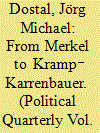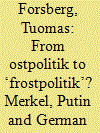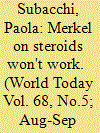| Srl | Item |
| 1 |
ID:
167905


|
|
|
|
|
| Summary/Abstract |
Germany's Christian Democrats have started preparing for the time after Angela Merkel. After ten years as German chancellor facing a weak opposition, Merkel unexpectedly split the country in late 2015 and early 2016 because of her ‘open border’ policies that allowed more than 1 million refugees and migrants to rapidly enter Germany. Her management of the subsequent crisis was largely considered a failure and her party suffered a series of dramatic election defeats. Reacting to the negative electoral feedback, and in particular the breakthrough of the rightist and anti‐immigration Alternative for Germany (AfD), the Christian Democratic Union organised an intra‐party contest to replace Merkel as party leader. Three candidates with different political profiles, Annegret Kramp‐Karrenbauer, Friedrich Merz and Jens Spahn, contested the election. By voting for Kramp‐Karrenbauer, the CDU membership voiced support for maintaining a large‐scale political coalition based on efforts to find compromises between different party wings and social and cultural interests.
|
|
|
|
|
|
|
|
|
|
|
|
|
|
|
|
| 2 |
ID:
145263


|
|
|
|
|
| Summary/Abstract |
Germany's relationship with Russia has historically been one of the most crucial in shaping Europe's fate. Despite radical transformation in the nature of European Great Power politics, it continues to be pertinent from the perspective of today's world. Germany's willingness to establish good relations with the Soviet Union in the late 1960s—its emphasis on economic relations and cooperation instead of political disagreements—prepared the ground for the end of the Cold War and German unification twenty years later. Germany's basic policy towards Russia remained broadly unchanged despite German unification and changes in the domestic political coalitions and leadership, sometimes against political expectations. In the European context, Germany's attitude towards Russia created the backbone of EU–Russia relations. During 2012–13, however, the continuity in Germany's policy towards Russia was seen as having come to an end. Political twists came to the fore and the atmosphere was loaded with tensions, made worse by the Ukrainian crisis. This article reviews the recent, alleged changes in Germany's policy towards Russia during the Merkel era. It asks two basic questions: first, whether Germany's policy really has changed and if it has, what are the theoretical tools that give us the best potential understanding of these changes? The article argues that the policy has changed, but not as dramatically as made out by some headlines. Moreover, the article suggests that a key element in analysing the degree of change in Germany's policy towards Russia is neither the external power relations nor domestic politics and related changes in the prevailing interpretation of national interest, though these are important too, but the interaction between the leaders and foreign policy elites.
|
|
|
|
|
|
|
|
|
|
|
|
|
|
|
|
| 3 |
ID:
126221


|
|
|
|
|
| Publication |
2012.
|
| Summary/Abstract |
Paola subacchi considers Europe's way out of its current crisis
|
|
|
|
|
|
|
|
|
|
|
|
|
|
|
|